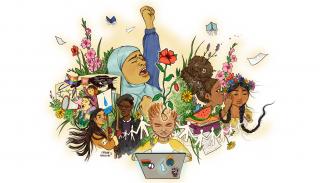
Breadcrumbs navigation
On Knowledge-making in the Arab World: Polycrises, Polarisation, and Impossibilities
During 2022-23, I was developing my book Islamophobia and Lebanon: Visibly Muslim Women and Global Coloniality while based at the University of Edinburgh. Examining anti-Muslim racism within an Arab-majority society, the book situates its participants' experiences of discrimination and assault within the larger structures of Eurocentric Modernity/coloniality as it explores internalised racism, mechanisms of erasure, and various forms of resistance, refusal, and negotiation. Doing this, it works to rethink Islamophobia specifically, and racialisation more broadly, alongside and from within the Arabic-speaking world.
In parallel, I was developing the research project from which the book emerged to examine similar dynamics in other sites of the Arabic-speaking world, namely in Tunisia and Egypt. Doing preliminary research and discussing these plans with colleagues and stakeholders in the region, I quickly realised the presence of multiple hurdles that make such work particularly difficult. Often, these revolved around safety, security, and the related impossibility of participant recruitment. I consequently decided to hold a series of Zoom calls and consultations with colleagues and contacts in both countries to discuss the project and its framing. Through these conversations, I came to increasingly grasp the significant risk to both myself as well as possible participants and grew more and more uncomfortable with conducting such fieldwork. Practical challenges as well as problematic ethics, in relation to both myself and potential participants or collaborators, consequently led me to shelve the project and move to other areas of research. The conceptual and theoretical critical knowledge and contribution that could have arisen from such fieldwork, therefore, remained un-made; unattainable.
While this is surely multi-scalar and complex, one issue was particularly prominent: the research would be read as a political critique of the current regime in each respective country. In the case of Egypt, for example, questions of intersectional inequalities and discrimination were bound to make ‘the state’ and the regime look bad, I heard again and again. Further, these were too entangled with national politics relating to Egypt’s recent history and political formations. If the research was to explore questions of Islamophobia in the Muslim-majority space, this would quickly be read as a statement in support of the Muslim Brotherhood in Egypt, for example. It was, in this respect, bound to be perceived as a political intervention in the favour of specific Islamic opposition groups and/or international rivals. As I sought to conduct preliminary interviews via Zoom, participants also seemed to be interpellating the project as a possible intervention in favour of specific present political options against others – situating the work as something they either supported or rejected based on an assumed political application it could hold.
About people’s lived experiences (rather than political groups, for example) and aligned with and informed by critical, feminist, queer, and anti/post/decolonial theories and methods in pursuit of liberatory alternatives, the project sought to critique and analyse the multiple extant forms of intersectional discrimination and their workings and to think of options and possibilities beyond the extant binaries and conversations. Yet, it seemed to be bound by current hegemonies and frames. Within this, a politics of complexity, contradiction, and ambivalence seemed extremely difficult. A politics holding a rejection of both the modern secular and the modern Islamic, of both the nation-state and its political opposition groups, of both Islamophobia and what some Iranian women have powerfully referred to as Islamotrauma, of both internalised self-hate beyond minority-majority framings as well as the multiple forms of assault and exclusion various minorities are subject to, seemed difficult to speak in charged polarised contexts of polycrisis haunted by multiple forms of Othering, exclusionary logics, and identitarian violences.
The (im)possibility of producing knowledge in, from, alongside, and for the Arab-majority region is significantly mired by the inability to conduct fieldwork in the region under authoritarian, distrustful, and exclusionary regimes. This is also challenged by wider polarised social formations that seek to situate knowledge-production within specific narrow power struggles. Straitjacketed as exclusively an intervention into the extant politics of/within the nation, knowledge that seeks to work outside, beyond, and against the terms of the extant conversation appears paralysed, impossible. The question is, ultimately, not only how can research be done, but what can be done with research within contexts haunted by polycrisis in a time where (specific definitions of) impact are increasingly fetishised and when dialogue is increasingly difficult.
Ali Kassem is a Lecturer in Sociology and Anthropology at the National University of Singapore. His research, engagement work, and teaching examine contemporary coloniality's functioning across questions and articulations of power and knowledge. His full bio can be found here.